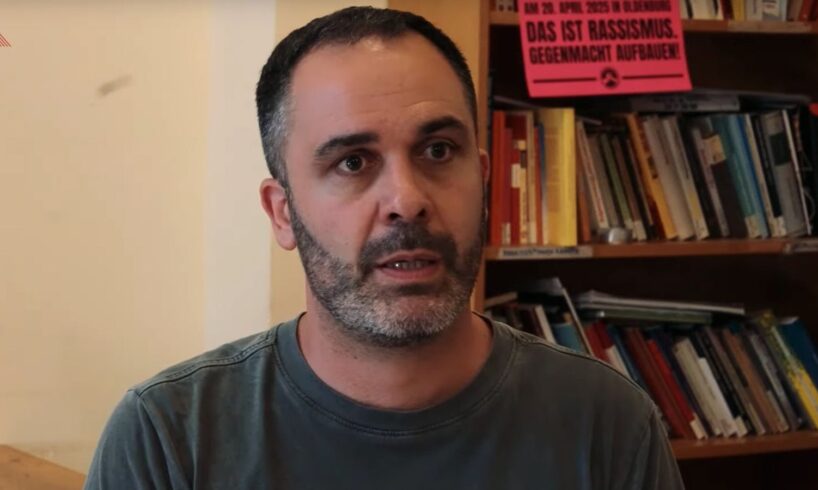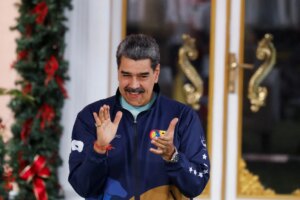
On May 20, 2025, the European Union (EU) took an unprecedented step: for the first time, German citizens and journalists were targeted by sweeping sanctions as part of the EU’s 17th sanctions package against Russia. Those affected include Berlin-based Turkish-Kurdish journalist and German citizen Hüseyin Doğru, founder of the media platform Red Media, as well as German-born journalists Alina Lipp and Thomas Röper, who live in Russia.
Hüseyin Doğru [Photo by LCM / youtube]
The sanctions against Doğru include the freezing of all bank accounts, an EU-wide travel ban and a de facto professional ban. This means that Doğru is forbidden from engaging in any form of paid employment or self-employment, and no one is legally permitted to provide him with any economic resources. In practice, even inviting him for a coffee would constitute a criminal offence.
The WSWS has reported on the Red Media ban.
According to the EU’s justification, Doğru’s reporting on the Palestine solidarity movement in Germany “sows ethnic, political and religious discord” and thus aids “Russia’s destabilising activities.”
Not only Doğru’s bank account but also that of his pregnant wife has been frozen, even though she is not named on the sanctions list. Doğru can access only a minimal subsistence allowance after weeks of approval by the Bundesbank (German Federal Bank). His freedom of movement has been curtailed, and he cannot legally be employed as a journalist—for instance by junge Welt, which enquired about hiring him—because, according to the German Economics Ministry, such employment would violate the EU’s “prohibition on making funds available” and would constitute a criminal offence.
On September 3, 2025, Doğru announced on X that the EU Council had rejected his lawyers’ appeal against the sanctions. He also published the “evidence pack” used to justify the measures, which consisted solely of a few tweets from his personal X account and from Red Media.
The NachDenkSeiten website confirmed via an EU source that these tweets were indeed the only “evidence” cited.
The posts in question are fully protected under freedom of expression. One discussed NATO’s recruitment of former officers in Hitler’s Wehrmacht (Army) such as Adolf Heusinger; two others criticised Chancellor Friedrich Merz’s militarist rhetoric; others commented on the “neoliberal disaster” of German reunification, reported on pro-Palestinian demonstrations and far-right marches in Germany, and covered protests against racist pogroms in Britain.
One tweet criticised the indifference of mainstream journalists, unions and press associations toward his case. Others referred to a Bundestag (parliamentary) resolution that could strip citizenship from those who criticise Israel and to racist remarks by a German MP, and expressed opposition to the Ukraine war, German rearmament and the poor living conditions of Ukrainian refugees. Red Media’s surveillance by the domestic intelligence agency was also mentioned.
The EU decision also makes sweeping and vague claims that Doğru and Red Media have “close financial and organisational ties to Russian state propaganda entities and actors,” with “deep structural connections” and “staff rotations” with Russian state media.
The “evidence” for these allegations consisted of only three press articles—from the Tagesspiegel, the Green-aligned taz, and the Zionist Jerusalem Post (the last two written by the same journalist). None provided proof beyond speculation and insinuation. The only verifiable fact is that Red Media took over the Telegram channel of Redfish, a media outlet formerly linked to Russia Today, and that some staff once worked there.
Nevertheless, at a federal press conference on October 1, Foreign Ministry spokesman Christian Wagner referred to Doğru as a “disinformation actor” and explicitly denied his status as a journalist, claiming that he was acting “on behalf of alleged Russian agencies”—an accusation not even made in the EU Council’s own decision.
The aggressiveness with which German authorities have enforced and defended the sanctions against a German citizen and journalist strongly suggests that Berlin itself was instrumental in initiating them.
The EU Council decision of October 8, 2024, which underpins these sanctions, defines “Russian influence activities” so broadly that virtually any critical political expression can be penalised. It is sufficient to be “planning, directing, participating in, supporting or otherwise facilitating the use of coordinated information manipulation and interference” to face sanctions—one of eight possible grounds. The word “disinformation” appears only in the preamble, not in the legal articles, and there is no statutory definition of “coordinated information manipulation.”
The EU’s External Action Service defines “Foreign Information Manipulation and Interference” (FIMI) as a usually non-illegal behaviour pattern that “can threaten or negatively affect values, procedures and political processes,” conducted “deliberately and in a coordinated way by state or non-state actors, including their proxies.”
To be clear, “a non-illegal [!] form of behaviour that merely contradicts official government policy” is sufficient grounds to deprive someone of their livelihood, impose an absolute professional and travel ban, subject them to surveillance and publicly stigmatise them.
The regulation also applies to “non-state actors and their proxies,” even if they only indirectly support or facilitate such supposed “illegal behaviour.” These are the hallmarks of a police-state regime trampling on freedom of expression.
The case of Hüseyin Doğru starkly demonstrates how little it takes to become a victim of such measures—just a handful of critical social media posts, support for protests, or tenuous associations with “hostile” countries or organisations. It is an extremely dangerous precedent for suppressing dissenting journalists. Doğru’s warning that mainstream media, unions and press associations are ignoring—or even collaborating in—this repression is entirely justified.
Sign up for the WSWS email newsletter





